Connecticut Power of Attorney Form Instructions
This document serves as a power of attorney in Connecticut, allowing an individual to designate a third party to manage property and finances. It includes essential terms, notes for drafting, and guidelines for completion. Ideal for residents seeking to appoint an agent for financial matters.
Edit, Download, and Sign the Connecticut Power of Attorney Form Instructions
Form
eSign
Add Annotation
Share Form
How do I fill this out?
Filling out the power of attorney form requires careful attention to detail to ensure all information is accurately captured. Begin by reading the instructions thoroughly, which will help in understanding what sections need to be filled. Make sure to consult with a legal advisor if you have any questions about selecting the right agent.

How to fill out the Connecticut Power of Attorney Form Instructions?
1
Read the entire document and instructions carefully.
2
Fill in the principal's personal information accurately.
3
Choose the agent and define their powers clearly.
4
Review and understand the implications of the powers granted.
5
Sign the document in front of a notary public.
Who needs the Connecticut Power of Attorney Form Instructions?
1
Individuals wanting to delegate financial responsibilities.
2
Anyone planning for incapacitation due to illness or injury.
3
Real estate owners needing someone to handle transactions.
4
People managing their own business affairs who require assistance.
5
Families wanting to ensure their elder relative's finances are managed.
How PrintFriendly Works
At PrintFriendly.com, you can edit, sign, share, and download the Connecticut Power of Attorney Form Instructions along with hundreds of thousands of other documents. Our platform helps you seamlessly edit PDFs and other documents online. You can edit our large library of pre-existing files and upload your own documents. Managing PDFs has never been easier.

Edit your Connecticut Power of Attorney Form Instructions online.
Editing your PDF on PrintFriendly is a straightforward process. You can change any text or add notes as needed with our efficient PDF editor. This tool is designed to be user-friendly, making document customization quick and easy.

Add your legally-binding signature.
Signing the PDF on PrintFriendly is seamless and convenient. You can electronically add your signature with just a few clicks. This functionality simplifies the signing process, allowing you to sign documents from anywhere.
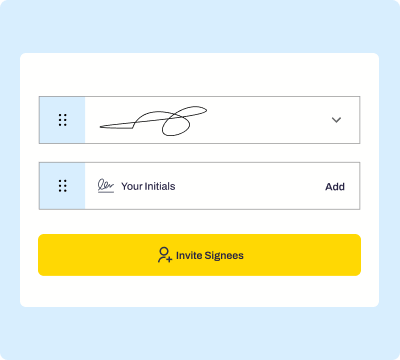
Share your form instantly.
Sharing your PDF on PrintFriendly is simple and effective. After editing, just use the share function to distribute your document via email or links. Connecting with others over important documents has never been easier, ensuring your power of attorney reaches the right hands.
How do I edit the Connecticut Power of Attorney Form Instructions online?
Editing your PDF on PrintFriendly is a straightforward process. You can change any text or add notes as needed with our efficient PDF editor. This tool is designed to be user-friendly, making document customization quick and easy.
1
Access the PDF editor through PrintFriendly.
2
Upload your Connecticut Power of Attorney form.
3
Select the areas you wish to edit.
4
Make your adjustments and ensure accuracy.
5
Download the modified document to save your changes.

What are the instructions for submitting this form?
To submit this power of attorney form, ensure all sections are completed accurately and signed in the presence of a notary public. You may submit it via email to your attorney or the relevant financial institution. For physical submissions, mail the completed form to the designated address indicated within the institution's guidelines, ensuring to follow up for their receipt.
What are the important dates for this form in 2024 and 2025?
For 2024 and 2025, ensure that all powers of attorney are in compliance with Connecticut laws effective since October 1, 2016. Annual updates or changes to your power of attorney should be made to reflect any changes in your life circumstances or preferences. It’s advisable to review your document every year or upon any major life event.

What is the purpose of this form?
The purpose of the Connecticut Power of Attorney form is to provide a legal framework for individuals to grant authority to a trusted agent to handle their financial matters. This document is crucial for ensuring that decisions regarding finances can be made in a timely and effective manner, particularly in cases where the individual is unable to do so themselves. Using this form helps prevent complications and ensures that your wishes are respected.

Tell me about this form and its components and fields line-by-line.

- 1. Principal Name: The full name of the individual granting the power.
- 2. Principal Address: The legal address where the principal resides.
- 3. Agent(s) Name(s): The name(s) of the person(s) being appointed as agents.
- 4. Agent(s) Address(es): The address(es) of the appointed agent(s) for further contact.
- 5. Powers Granted: Details of the powers the principal is giving to the agent.
What happens if I fail to submit this form?
Failure to submit the completed form may result in the inability to execute financial decisions when needed. It can lead to delays in managing financial affairs or appointing someone to do so in case of incapacity. Incomplete forms can also lead to legal complications regarding the authority of the appointed agent.
- Inability to Manage Finances: Without a valid power of attorney, someone may struggle to manage your financial matters.
- Legal Complications: Incomplete submissions might cause issues in establishing the authority of the designated agent.
- Delays in Decision-Making: Not having a submitted document may lead to delays when urgent financial decisions are needed.
How do I know when to use this form?

- 1. Incapacity Planning: To ensure someone can manage your finances if you become incapacitated.
- 2. Real Estate Transactions: To authorize someone to handle property sales, purchases, or leases.
- 3. Business Management: To allow an agent to oversee business dealings and decisions.
Frequently Asked Questions
What is a power of attorney?
A power of attorney is a legal document that allows one person to authorize another to act on their behalf in financial and legal matters.
Who should I appoint as my agent?
You should appoint someone you trust, who understands your financial situation and can make decisions in your best interest.
Do I need a lawyer to create a power of attorney?
While you can create one without a lawyer, consulting a legal professional is advisable to ensure that it meets all legal requirements.
What if I change my mind about my agent?
You have the right to revoke or change your appointed agent as long as you are of sound mind.
How do I ensure my power of attorney is valid?
Make sure to sign it in front of a notary public and comply with local laws regarding witnessing.
Can I specify what powers my agent has?
Yes, you can specify which powers your agent does or does not have within the document.
Are there any limits to the powers granted?
Yes, the powers granted must be clearly defined and cannot exceed what is legally permissible.
What happens if my agent is unable to act?
You can appoint successor agents in your power of attorney document to ensure continuity.
Is the power of attorney effective immediately?
It can be made effective immediately, or you can choose to have it activated upon a specific condition, like incapacity.
What should I do with the completed form?
Store it in a safe place and provide copies to your agent and any relevant financial institutions.
Related Documents - CT Power of Attorney
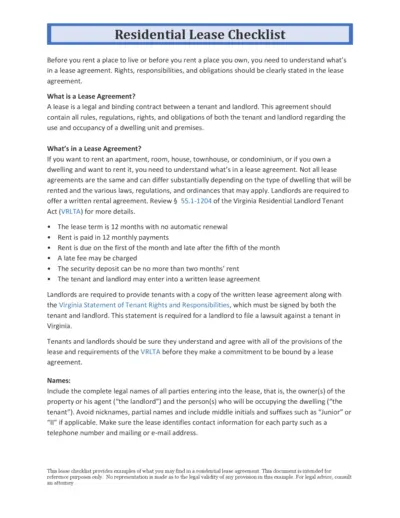
Residential Lease Agreement Checklist for Tenants and Landlords
This document provides a detailed checklist of what both tenants and landlords need to know and include in a residential lease agreement. It covers key elements such as lease terms, rent payment schedules, and maintenance responsibilities. Use this guide to ensure all rights and obligations are clearly outlined in your lease agreement.
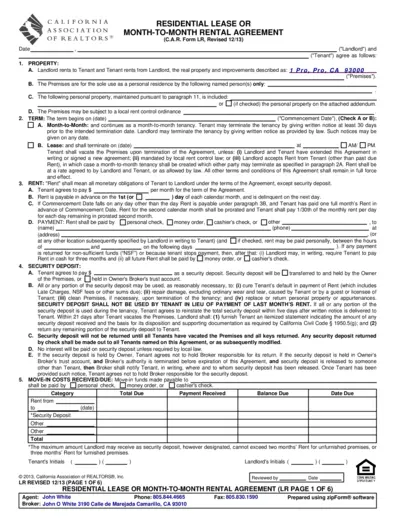
Residential Lease or Month-to-Month Rental Agreement
This file contains a comprehensive residential lease or month-to-month rental agreement used in California. It provides details on terms, obligations, and conditions for both landlords and tenants. Perfect for those seeking a standardized rental agreement form.
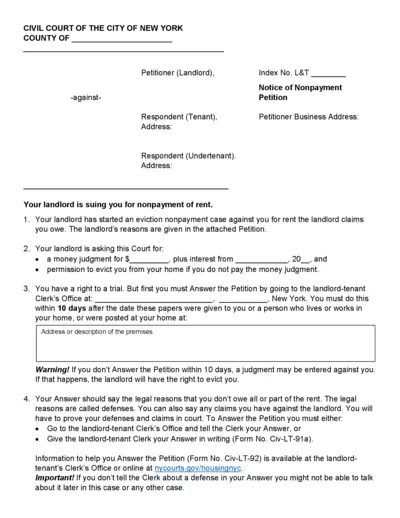
Civil Court of the City of New York Nonpayment Petition
This document is a Notice of Nonpayment Petition issued by the Civil Court of the City of New York. It details the actions that a landlord can take against a tenant for nonpayment of rent. It includes instructions on how the tenant can respond and their rights.
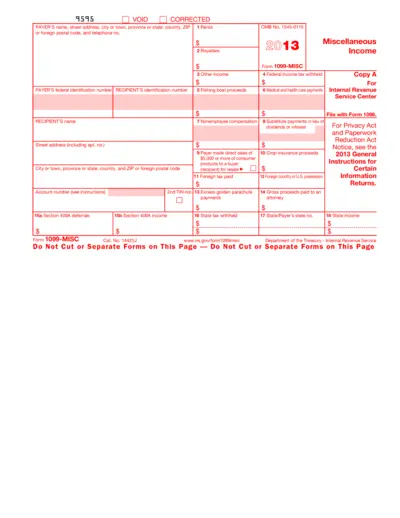
Form 1099-MISC: Miscellaneous Income for 2013
This file is a 2013 version of the IRS Form 1099-MISC used to report miscellaneous income. It includes fields for reporting various types of payments made to individuals or entities. The form is typically filed by payers to report income paid to recipients.
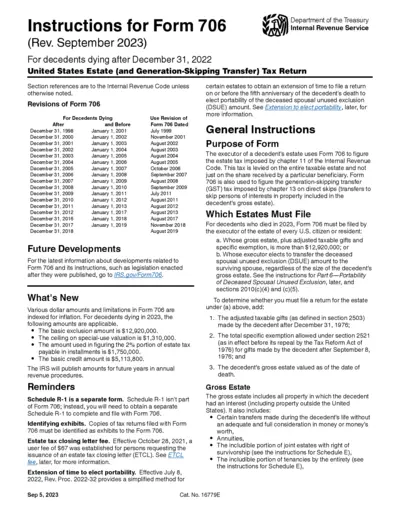
Instructions for Form 706 (Rev. September 2023)
This document provides detailed instructions for completing Form 706, the United States Estate (and Generation-Skipping Transfer) Tax Return for decedents dying after December 31, 2022. It includes information on revisions, general instructions, and specific filing requirements. The instructions also cover important updates and reminders related to the form.
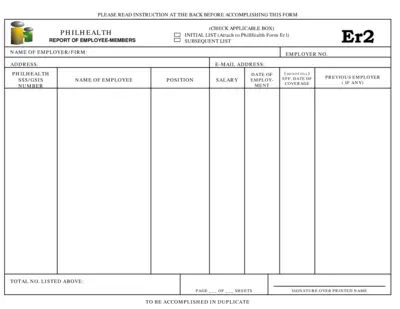
PhilHealth Report of Employee-Members Form Instructions
This file provides instructions for employers on how to fill out and submit the PhilHealth Report of Employee-Members form. It is essential for employers to report new hires to PhilHealth to ensure proper coverage. Detailed instructions and requirements are included.
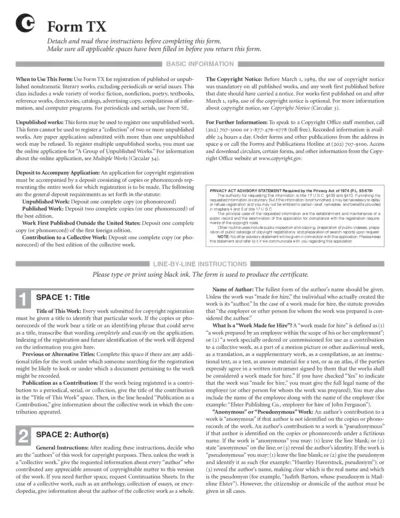
Copyright Registration Form TX Instructions
This form is used for the registration of nondramatic literary works, such as fiction, nonfiction, poetry, textbooks, and computer programs. It provides detailed information on how to complete the form, including what information is required for each section and how to submit the application. Use it to ensure your work is properly registered for copyright protection.
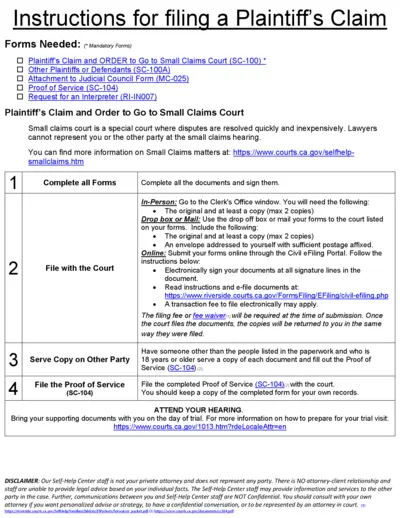
Plaintiff's Claim and Instructions for Small Claims Court
This file provides instructions and necessary forms for filing a Plaintiff's Claim in Small Claims Court. It includes details on filling out, submitting, and serving the forms. Ensure to follow the steps carefully to protect your rights.
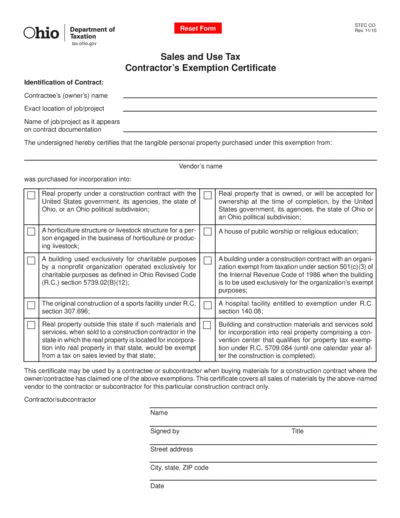
Ohio Sales and Use Tax Contractor's Exemption Certificate
This document is the Ohio Sales and Use Tax Contractor's Exemption Certificate. Contractors use this form to claim exemptions on certain taxable goods for specified exempt uses. It's crucial for contractors working with tax-exempt entities or on tax-exempt projects.
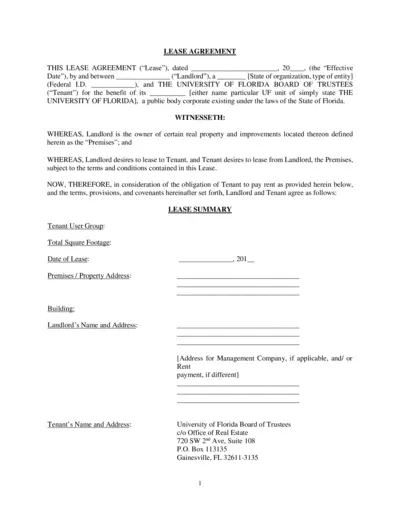
Lease Agreement for University of Florida Premises
This lease agreement file outlines the terms and conditions for renting a property owned by the Landlord to the University of Florida Board of Trustees. It covers key aspects such as lease term, rent details, improvements, and permitted use. Ideal for landlords and tenants involved in leasing agreements.
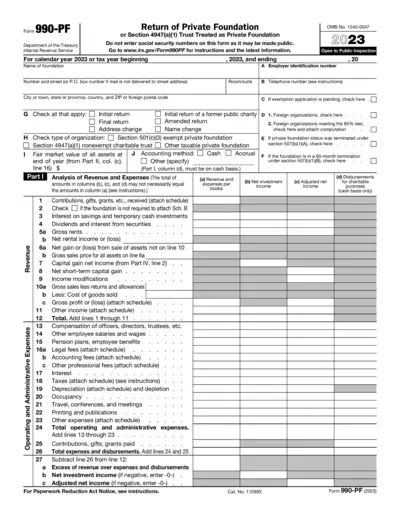
Return of Private Foundation Form 990-PF 2023
Form 990-PF is a return for private foundations required by the IRS. It includes information on revenue, expenses, and other financial details. Avoid entering social security numbers on this form.
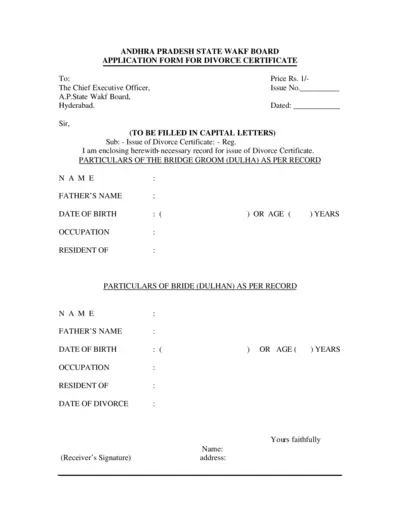
Application Form for Divorce Certificate - Andhra Pradesh State Wakf Board
This form is used to apply for a Divorce Certificate from the Andhra Pradesh State Wakf Board in Hyderabad. The form requires details of both bride and groom as per recorded information. It also includes fields for verification and office use only.